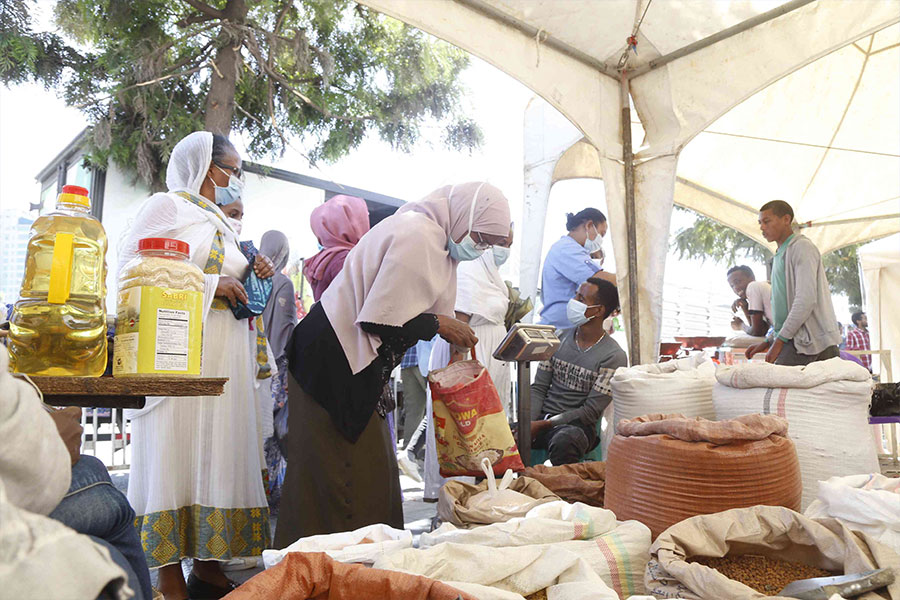
Fortune News | Jan 11,2020
Jan 7 , 2022
By TSION HAILEMICHAEL ( FORTUNE STAFF WRITER )
A federal regulatory agency with authority to issue permits for importers and distributors of agricultural inputs is in the making.
Last week, a draft regulation for establishing the Ethiopian Agriculture Authority (EAA) was sent to the Ministry of Planning & Development. Part of the Authority's mandate will involve overseeing the provision of fertiliser and seeds. These inputs have mainly been out of the private sector's reach as the supply chain remains in the hands of the state and public enterprises. However, private businesses' role in importing and distributing agrochemicals, such as pesticides, is relatively robust.
Since the state subsidy and monopoly over pesticide distribution ended in 1995, the private sector has been getting its piece of the pie. There were 24 agrochemical importers a decade ago, compared to 133 this year.
Issuing certificates of competence and registration of importers and distributors of agrochemicals has thus far been delegated to the Agricultural Inputs Marketing Directorate at the Ministry of Agriculture.
The Ministry is among the federal agencies that are going through a restructuring after the formation of the current administration in September 2021.
Over the coming decade, the Ministry, led by Oumer Hussien, is tasked with boosting the productivity of the agricultural sector. Its officials expect the sector's value to increase by 6.5pc annually while they hope to see agricultural productivity double from an average of 36 quintals a hectare.
“Once the Authority is established, there'll be better monitoring and control systems,” said Mekdes Nega, head of the directorate.
People who follow the development believe the separation of the regulatory body from the Ministry serves two advantages. It allows the Ministry to focus on policy implementation rather than being bogged down with cumbersome registration and licensing duties, according to Esayas Lemma, director of crop development at the Ministry. It will also give the agency a regulatory capacity.
Ethiopia imports 40,000tn of agrochemicals such as insecticides (70pc), herbicides (25pc) and fungicides annually. Adami Tulu Chemical Company is the sole domestic producer of agrochemicals. Incorporated in 1998 with a capital of 40.5 million Br, the company imports active ingredients and solvents to produce pesticides. Last year, the company produced 440tn of pesticides.
The floriculture industry has been importing chemicals without import permits since 2017.
The imported and locally-produced agrochemicals only cover close to half of the demand from 18 million smallholder farmers, who harvest 22.8 million hectares of land. In the last Mehir harvest season, 6.9 million small scale farmers used agrochemicals on 4.5 million hectares of cultivated land.
Industry players say the low volume of agrochemical imports is partly due to extensive bureaucracy facing importers.
Agrochemical importers must hold a certificate of competency to import pesticides and submit documents from their suppliers describing the different characteristics of the chemicals. Shipments are subjected to laboratory tests upon arrival, and the samples are sent to research institutions and universities for testing.
“It's a tiresome process,” said Beshir Hassen, Awowo Import & Export Plc general manager.
His company used to import agrochemicals and distribute them to unions but stopped importing two years ago due to the hassle he faced. There is a cumbersome bureaucracy to issue certificates of competency or licensing importers, handled by a small group of staff at the Ministry, according to Medemdemiaw Neknekie, a senior expert in crop development at the Ministry.
“Once the Authority is established, it will expand to the directorate level," said Medemdemiaw, also one of the experts who drafted the regulation.
Farmers are forced to buy pesticides from unlicensed traders, enjoying a flourishing trade. Although not much is known about the illicit agrochemicals sold in the parallel market, officials of the Ministry estimates half of the national demand is met through contraband trade.
Kefenie Gebaga, 70, is a farmer in Meki, in the East Shewa Zone of the Oromia Regional State. He cultivates maize, wheat and vegetables on four hectares of land. Although he prefers to buy pesticides from the Union operating in his town, they run out of stock quickly.
“This forces me to buy from the unlicensed traders,” Kefenie told Fortune.
Last year, Meki Union distributed 12,000 litres of agrochemicals to the 9,000 farmers under its membership. It was not a volume sufficient to meet demand, disclosed Kumssa Guddisa, manager of the Union, which comprises 152 cooperatives. It buys agrochemicals from Adami Tulu Chemical.
Farmers often go to illicit traders as they are more flexible in the volume of chemicals they sell. When buying through formal channels, farmers are forced to choose between five or 10-litre containers, which many cannot afford. They often opt for the informal trade as the unlicensed distributors sell chemicals decanted into smaller containers.
Some of the unregistered pesticides are imported through the incentive mechanism provided to flower growers, according to Medemdemiaw.
“There are also chemicals that enter the country through border areas," he told Fortune.
Still, the contraband trade exposes farmers to high costs.
Last year, Kefenie bought a litre of pesticide at 550 Br from unlicensed traders, although the price through Meki Union was 100 Br less. The cost of a litre of pesticide supplied by unlicensed traders stood at 260 Br two years ago. The illicit trade also comes with other risks. It can be detrimental to harvests.
Last year, Kefenie lost the onion he had planted on half a hectare of land due to expired chemicals he bought from unlicensed traders.
"The instructions are written in a foreign language; farmers have no way of knowing whether the products have expired,” said Kumssa.
Agriculture extension workers closely follow up the activities of farmers.
“But there's little they can do if the farmers want to use agrochemicals supplied by unlicensed traders,” said Mekdes.
Though industry insiders agree the Authority will allow for improved regulatory capacity, some argue there are other measures officials can take to improve the supply of agrochemicals and protect farmers' interests. Besides allocating more workforce, the government should relax the requirements to import more pesticides through licensed businesses, said Beshir of Awowo Plc.
PUBLISHED ON
Jan 07,2022 [ VOL
22 , NO
1132]

Fortune News | Jan 11,2020

Agenda | Jun 25,2022

Fortune News | Jan 09,2021

Fortune News | Mar 16,2019

Fortune News | Nov 02,2019

Verbatim | Sep 24,2018

Radar | Jan 12,2019

Radar | Dec 14,2019

Fortune News | Jul 21,2024

Fortune News | Dec 19,2020

Dec 22 , 2024 . By TIZITA SHEWAFERAW
Charged with transforming colossal state-owned enterprises into modern and competitiv...

Aug 18 , 2024 . By AKSAH ITALO
Although predictable Yonas Zerihun's job in the ride-hailing service is not immune to...

Jul 28 , 2024 . By TIZITA SHEWAFERAW
Unhabitual, perhaps too many, Samuel Gebreyohannes, 38, used to occasionally enjoy a couple of beers at breakfast. However, he recently swit...

Jul 13 , 2024 . By AKSAH ITALO
Investors who rely on tractors, trucks, and field vehicles for commuting, transporting commodities, and f...

Oct 25 , 2025
The regulatory machinery is on overdrive. In only two years, no fewer than 35 new pro...

Oct 18 , 2025
The political establishment, notably the ruling party and its top brass, has become p...

Oct 11 , 2025
Ladislas Farago, a roving Associated Press (AP) correspondent, arrived in Ethiopia in...

Oct 4 , 2025
Eyob Tekalegn (PhD) had been in the Governor's chair for only weeks when, on Septembe...